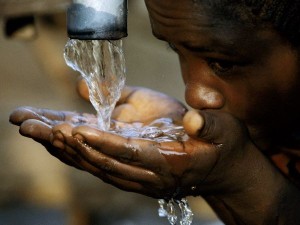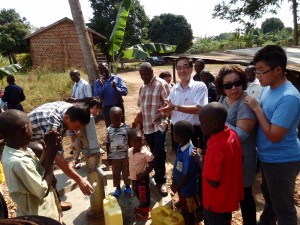“They shall not hunger or thirst, neither scorching wind nor sun shall strike them down, for he who has pity on them will lead them, and by springs of water will guide them.” [Isaiah 49:10, NRSV]
[L] Freshwater ecoregion. [M] Drinking from a freshwater tap. [R] Joseph and Irene at the stand pump, with pilgrims and locals looking on.
Water is life. It is elemental, essential, mysterious and sacred. The survival of humans, and of every ecosystem on earth, relies on water. We cook with it, bathe in it, wash with it, even play in it and, of course, we drink it. Water hydrates, purifies, cleanses, restores, and heals. Its intrinsic values are wholly independent of its utilitarian and commercial exploits, so that access to sufficient safe and clean water for personal and domestic use has long been recognized as a human right. And that means, more so for Christians than it ought to be for others, social justice in this area is a valid demand on us.
Catholic social teaching sets out a clear direction for our faith-filled choice to ensure that all people and all our fellow creatures have access to sufficient water supply to sustain life and health. There are two foundational magisterial documents that not only trace the basic outlines of Catholic belief in regard to this sacred gift from the Creator, but also offer insights on our common call to water-justice and thus a useful resource for reflection on any fresh-water-ministry. These documents are the contributions from the Pontifical Council for Justice and Peace to the United Nations’ Third (Kyoto, 2003) and Fourth (Mexico City, 2006) World Water Forum. The teachings in these two documents have been reaffirmed and elaborated on different occasions and in different contexts by Popes John Paul II and Benedict XVI.
Two elements in the magisterial documents lend insights to our reflections on our recent pilgrimage of pain and hope to Uganda and Rwanda.
1. Water, an essential element of life
Water is life giving and essential to survival. More than just a basic human need, water is an essential element of life. It is “an irreplaceable element to ensuring the continuance of life”.
- “Water is intrinsically linked to fundamental human rights such as the right to life, to food and to health. Access to safe water is a basic human right.”
In a way which is clearly biblical in inspiration, the Pontifical Council first drags the world’s attention to one singular focus, that is, the human person. The “right to water” rests on the understanding that “the human person must be the central point of convergence of all issues pertaining to development, the environment, and water.” The Vatican therefore calls on the world community to ensure that the essential minimum level of the right to water is realized. “People must become the active subjects of ‘safe water’ policies.”
The Pontifical Council also calls attention to the goodness of the spirit of “solidarity”. In the Catholic tradition,
- “solidarity is a firm and persevering commitment to the common good, to the good of all and of each individual. It presupposes the effort for a more just social order and requires a preferential option for the poor.”
This duty to the cause of co-humanity rests upon individuals as much as it does on nation states. Advanced nations and wealthier individuals, needless to say, have the weightier obligation to lend a helping hand, for “to whom much is given, much also is demanded” [Luke 12:48].
2. Water Scarcity and Deprivation
Safe drinking water sustains life. Conversely, the absence of clean, fresh water leads to desiccation, decline, or even death. Safe drinking water is indispensable for life. And yet, a vast number of the human population faces enormous hardship daily trying to locate and collect enough of safe water for their families. When access to neither sufficient nor safe water is denied to a people, women disproportionately bear the burden of this “lack”. As we have noted in post No. 20 of 16 November 2010 on “Clean Water Project – Borehole-Wells,” little children walk long distances to collect poor quality water for home consumption which families in some Western countries would not consider using to even water their lawn.
So while water is an essential element of life, the reality of the supply situation in the world is such that the Pontifical Council notes:
- “The problem of water scarcity and water deprivation is experienced most dramatically by men and women living in poverty and often in the poorest countries.”
- “The many children who die each year in poor countries due to the lack of access to safe water and sanitation are a loss for the future of the whole world and for humanity as a whole.”
For Christians, and indeed for all people of good will with or without religious faith, water is a “sacred” gift for life. As such, the gift of water is a matter that inspires gratitude. And for us Christians, this gratitude takes on a special significance:
- “A spirituality of gratitude takes us beyond seeing water as only a physical or economic good, and even a social or cultural good: Water is a gift of the Creator and treated as a sacramental commons for its unique life-giving role in creation.”
A Grateful Response
The Christian life is attuned to gratitude and praise for God’s gifts. Just as true worship is proven in congruent actions, a deep-seated spirit of gratitude is seen in the matching actions it generates.
As we have reported three years ago, our friend Fr. Emmanuel Katongole has a wonderful freshwater ministry. On our second trip to Uganda, one of the most delightful events was the commissioning of a freshwater borehole well. In obvious gratitude for what they have received in life, and desiring to give-back through acts of solidarity and co-humanity, our dear friend Joseph Siaw and his business partner in Sibu made a donation through Fr. Emmanuel for a freshwater well in a Ugandan village of his choice. At the commissioning by Joseph and his wife Irene, freshwater from Sibu was poured over the running water raised from the well by a hand-pump, the two waters returning to earth wholly blended and indistinguishable, signifying human bonding and solidarity. In his speech of thanks to the donors, the school headmaster of the area spoke of the immense benefits the well brings to the children attending school there, as well as the entire neighbourhood of several villages.
Copyright © Dr. Jeffrey & Angie Goh, March 2014. All rights reserved.
You are most welcome to respond to this post. Email your comments to jeffangiegoh@gmail.com. You can also be dialogue partners in this Ephphatha Coffee-Corner Ministry by sending us questions for discussion.



